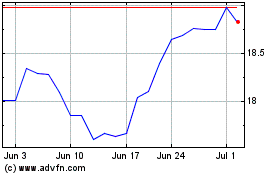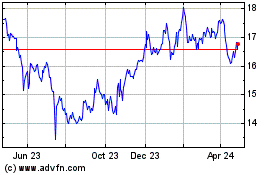By Drew FitzGerald and Sarah Krouse
This article is being republished as part of our daily
reproduction of WSJ.com articles that also appeared in the U.S.
print edition of The Wall Street Journal (June 18, 2018).
On the second day of hearings over AT&T Inc.'s bid to buy
Time Warner Inc., lead defense lawyer Daniel Petrocelli rebutted a
Justice Department attorney who mentioned his long experience
litigating corporate competition issues.
Unlike his opponent, "who's tried many, many antitrust cases,
and I admire him, I've tried a total of zero," Mr. Petrocelli said.
"But I've been around the block a couple of times."
U.S. District Judge Richard Leon, who would decide the case's
outcome, joked he would make a judicial note of it.
The exchange foreshadowed a hallmark of the companies'
ultimately successful defense, which relied on simplicity and
aggressive cross examination.
That strategy helped sow doubts about the Justice Department's
allegation, that the combination of AT&T's distribution network
and Time Warner's popular channels would lead to higher pay-TV
prices.
Judge Leon on Tuesday rejected the government's claims, allowing
the companies to close a roughly $81 billion transaction after
nearly two years of waiting.
The judge wrote in a harshly worded 172-page opinion that the
plaintiffs had failed to meet their burden of proof. Mr. Petrocelli
is a trial attorney better known for representing celebrities. His
high-profile corporate assignment came on the heels of another
politically fraught matter: He represented President Donald Trump
in a class-action fraud lawsuit against Trump University that ended
up settling, but not before Mr. Trump accused the judge of being
biased because of his Latino heritage.
Mr. Petrocelli was backed in the AT&T case by a horde of
antitrust experts and other specialists. But he handled most
testimony, often attacking the government's witnesses to strip away
their credibility.
"You don't know without looking at the document, correct?" Mr.
Petrocelli once asked University of California, Berkeley Professor
Carl Shapiro, the government's chief economic witness, referring to
data that figured into his report on leverage in pay-TV
negotiations.
Mr. Shapiro looked annoyed and commended Mr. Petrocelli for his
"flair" in picking out a detail from a long report. "You've got me
on that one," he said. "I didn't get you," Mr. Petrocelli
responded. "You got you."
Mr. Shapiro didn't reply to a request for comment.
The Justice Department won some evidentiary skirmishes, getting
often-embarrassing internal AT&T documents admitted into the
record. But AT&T lawyers often spent more time attacking
opposing witnesses than they did defending against the documents'
content.
When Mr. Petrocelli did sweat the details, it was often to
demand some piece of corroborating evidence from a government
witness, then assailing that expert or executive for not producing
it.
Company attorneys also fought to keep public the testimony from
rivals of AT&T and its DirecTV satellite unit. Lawyers for
cable and satellite providers such as Charter Communications Inc.,
Comcast Corp., Cox Communications Inc. and Dish Network bristled at
discussing sensitive negotiations in public.
But defense lawyers wanted them to be watched, according to a
member of Mr. Petrocelli's team, figuring they would be less likely
to warn that AT&T could kill their business if their own
investors were privy to the testimony.
The gambit worked. Mr. Petrocelli attacked executives from Cox
and Dish on the witness stand, and Comcast, itself an owner of
NBCUniversal's media assets, didn't give the government much
compelling testimony.
Judge Leon on Tuesday said their testimony was of "limited
probative value."
"AT&T did practically everything right, and the Justice
Department did everything wrong," said Nicholas Economides, a
professor of economics at New York University's Stern School of
Business who watched part of the trial.
Mr. Economides said he viewed the odds of the case as even when
it started, but said those odds changed as the trial wore on. He
said the government presented a complicated theory "and its
exposition was relatively poor."
Justice Department lawyers often took issue with the way the
companies defended their case and accused their lawyers in a
post-trial brief of making "a mockery of the judicial system."
Makan Delrahim, the department's antitrust chief, said in an
interview after a public appearance in New York on Wednesday that
he didn't know whether the agency would appeal the decision.
"Do I agree with it? No, but if I was faced with the same facts
and case and economics would I bring it again? Yes," he said. "I
don't think our case or evidence or theories were flawed," Mr.
Delrahim said.
--Brent Kendall contributed to this article.
Write to Drew FitzGerald at andrew.fitzgerald@wsj.com and Sarah
Krouse at sarah.krouse@wsj.com
(END) Dow Jones Newswires
June 18, 2018 02:47 ET (06:47 GMT)
Copyright (c) 2018 Dow Jones & Company, Inc.
AT&T (NYSE:T)
Historical Stock Chart
From Mar 2024 to Apr 2024

AT&T (NYSE:T)
Historical Stock Chart
From Apr 2023 to Apr 2024
